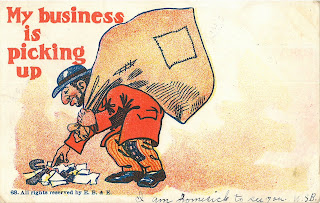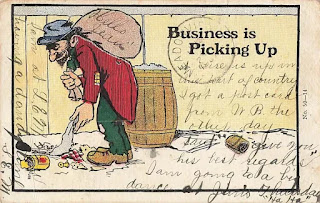Postcards with the image of a Jew picking up garbage accompanied by the text "my business is picking up," is an example of such derogatory imagery. The phrase "my business is picking up" is likely intended as a pun, playing on the idea of picking up garbage as a literal occupation and suggesting that this is somehow associated with being Jewish.
These kinds of images and messages were part of a broader trend of anti-Semitic propaganda and discrimination that Jews faced in many parts of the world during the early 20th century. While such imagery is offensive and harmful, it can also serve as a reminder of the persistence of prejudice and the importance of challenging stereotypes and promoting understanding and tolerance.
Deltiology
The copyright notice font (and sometimes the placement) could change between runs because it wasn’t part of the original artwork—it was usually typeset separately and added in the lithographic process.| Artist:
Publisher: Ely, Boynton & Ely Printer: Date: (1903–1905) In the early 1900s (1903–1905), italics were often used for fine-print legal phrases like “All rights reserved” — mimicking book-publishing practice. |

|
| Artist:
Publisher: Ely, Boynton & Ely Printer: Date: 1906 - 1907, Postmarked 1907 (undivided back) The copywrite notice shifted toward upright roman or bold sans-serif fonts, partly for legibility (these cards were mass-market items, unlike books). |

|
| Artist:
Publisher: Ely, Boynton & Ely Printer: Date: Probably 1908, divided back, postmarked 1910 Color variant of the first issue. Probably printed late 1907–08, when E. B. & E. were wrapping up operations. The use of the same italic copyright line shows that they recycled earlier stones rather than investing in new typesetting for their closing years |

|
|
Artist:
Publisher: International Postcard Company Printer: Type: Leather Date: 1905 (Lewis and Clark Exposition in Portland) |

|
|
Artist:
Publisher: Adolph Selige Pub Co., St. Louis, Missouri Printer: Type: Regular Date: 1905 - 1907 (Undivided back) |

|
#postcards #JewsAreDifferent






No comments:
Post a Comment
Feel free to comment, but please leave your name